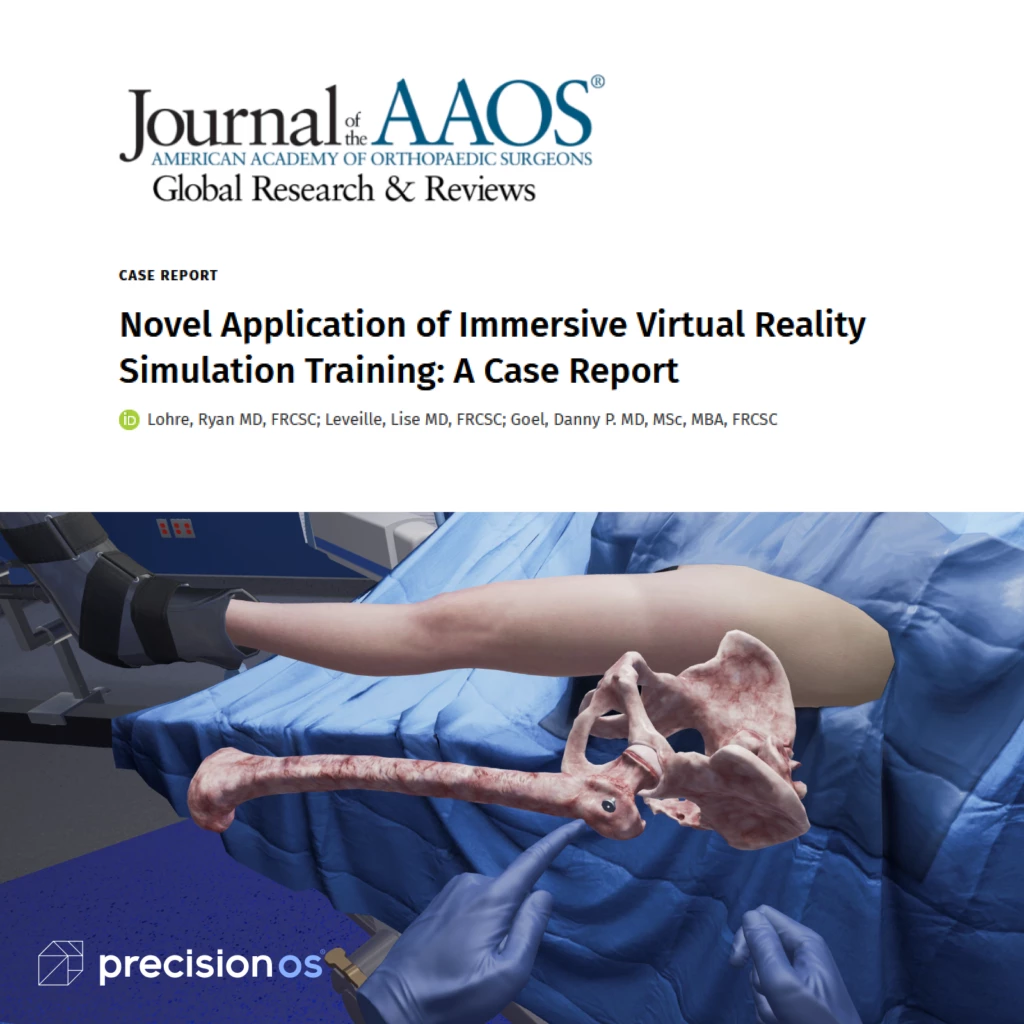VANCOUVER, BC, 7 de diciembre de 2021. Los investigadores ahora tienen el primer informe de caso de cómo las habilidades adquiridas a través de PrecisionOS El entrenamiento de realidad virtual inmersiva (iVR) puede mejorar e impactar directamente el desempeño del cirujano en un caso operatorio real.
The documented report, which involved PrecisionOS® orthopedic surgeon training used at the University of British Columbia Medical Center (UBC), was published in JAAOS Global Research & Reviews, November 2021-Volume 5, issue 11. “Novel Application of Immersive Virtual Reality Simulation Training: A Case Report.”
Esquema del estudio: un paciente de 15 años se presentó con dolor crónico en la ingle y las piernas. El cirujano tratante diagnosticó al joven con deslizamiento de la epífisis de la cabeza femoral (SCFE) y realizó un procedimiento de colocación de clavos percutáneos (colocación de un implante en la cadera), deteniendo la cirugía debido a la dificultad para visualizar la estructura ósea de la pierna y su interpretación. Posteriormente, el cirujano devolvió al paciente al quirófano (quirófano) para un segundo intento que tampoco tuvo éxito. Estos dos intentos quirúrgicos fallidos involucraron dosis significativas de anestésico y radiación.
The patient was then transferred to the children’s hospital in the same medical center where the fifth-year orthopedic resident on duty practiced with a SCFE training module four consecutive times using the PrecisionOS iVR system The resident, who had not observed nor performed this procedure in more than two years improved his 3D spatial awareness by using the capability of the VR software to pull the deformed bone out of the body, and, after using many unique approaches and implant sizes offered by the PrecisionOS training module, determine the right implant for the procedure.
After completing the training, where his practices showed he had improved his performance evaluation from 70% to 93% (maximum score 100%). on PrecisionOS’ proprietary Precision Score tm Luego, el residente fue a una sala de operaciones en vivo (bajo la supervisión de un cirujano ortopédico asistente capacitado en pediatría) y colocó el hueso en la ubicación correcta. Durante su práctica de cirugía, también aprendió que podría usar una cantidad significativamente menor de radiación. .
PrecisonOS’ proprietary analysis score takes into consideration several variables related to performance including errors made, implant chosen, complications and technical skill. From the first to last practice case, the resident’s time was lowered from 8 minutes 44 seconds in the first session to 3 minutes 46 seconds, equating to a 232% reduction in training time.
Unlike any other system, this resident had the opportunity to engage in true simulation using the PrecisionOS system. It’s very encouraging to see how this technology, and their validated research findings can now have a direct impact on patient care,”. Dr. Kishore Mulpuri, Orthopedic Surgery Chair, UBC, said. This software has significant patient safety implications which is always our top priority as clinicians and educators”
El entrenamiento con PrecisonOS también significó que el paciente finalmente estuvo expuesto a una décima parte de la dosis de radiación de las cirugías fallidas originales, y mucho menos tiempo de anestesia, estableciendo las importantes implicaciones de seguridad del paciente de este sistema.
“Being able to really feel like I actually performed the procedure four times before taking the patient to the OR was like night and day,” Ryan Lohre, M.D., the surgical resident who performed this procedure, stated. “It is not a stretch to say that PrecisionOS’ virtual reality training truly has the potential to save millions of patients from unnecessary pain, radiation, anesthetic time and hospitals from significant costs.”
The Case Report suggests that the use of the unique and validated approach to simulation implemented by PrecisionOS offers an unparalleled opportunity for surgeons’ to improve their performance, decision making, cognitive understanding and psycho motor skills before performing treatments on patients
Sobre PrecisionOS
PrecisionOS was founded in partnership with clinical orthopedic surgeon educators and an expert group of XR (virtual reality, augmented reality and mixed reality) developers to create training for orthopedic surgeons. The company’s immersive simulations are scientifically validated, peer-reviewed and published in leading medical research journals. Participants engage in a realistic operating environment, alone or in collaboration with other trainees anywhere in the world, test their knowledge and desire to try alternate approaches, receive instructive feedback and repeat procedures until achieving proficiency.
PrecisionOS tiene su sede en Vancouver, BC, con afiliaciones colaborativas con más de 40 instituciones médicas importantes en los EE. UU. Y Canadá. Su software se ha utilizado en más de 35 países y 500 ciudades en todo el mundo.
Contacto con los medios:
Elaine Murphy; 818.613.1951; emurphypr@outlook.com


